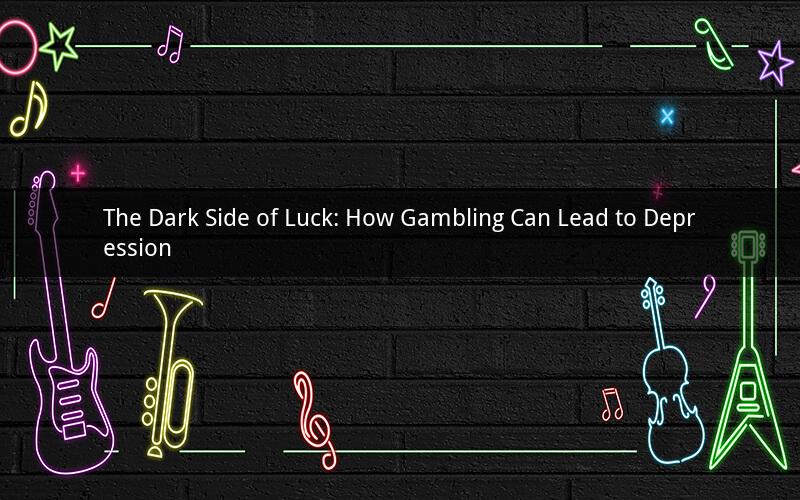
Gambling, a popular form of entertainment for many, can sometimes have severe consequences. One of the most concerning issues is the potential link between gambling and depression. In this article, we will explore the reasons why gambling can lead to depression and how it affects individuals. Additionally, we will discuss the signs of depression in gamblers and the importance of seeking help.
1. The Psychological Impact of Gambling
Gambling can be an exhilarating experience, but it can also have a profound impact on an individual's mental health. The thrill of winning and the fear of losing can create a psychological rollercoaster, leading to emotional distress and anxiety. Here are some reasons why gambling can cause depression:
a. The chase for the high: Gamblers often become addicted to the adrenaline rush they get from taking risks. This chase for the high can lead to a constant state of anxiety and dissatisfaction, which can contribute to depression.
b. Financial stress: The financial aspect of gambling can be a significant source of stress. Gamblers may accumulate debt, lose their savings, or even face legal consequences. This financial strain can lead to feelings of hopelessness and despair, which are hallmark symptoms of depression.
c. Loss of control: Gamblers may feel a loss of control over their lives, as they become increasingly dependent on gambling to cope with their emotions. This loss of control can exacerbate feelings of anxiety and depression.
2. The Link Between Gambling and Depression
Research has shown a clear connection between gambling and depression. Studies have found that individuals with a gambling disorder are more likely to experience symptoms of depression. Here are some key points regarding the link between gambling and depression:
a. Comorbidity: Depression and gambling disorder often co-occur. Individuals with a gambling disorder are twice as likely to have a mood disorder, such as depression, than those without a gambling disorder.
b. Shared risk factors: Several risk factors for depression, such as impulsivity, low self-esteem, and a history of trauma, are also associated with gambling disorder. This suggests that the two conditions may have a common underlying cause.
c. The cycle of depression and gambling: Depression can lead to gambling, and gambling can exacerbate depression. This cycle can be difficult to break and may require professional intervention.
3. Signs of Depression in Gamblers
Recognizing the signs of depression in gamblers is crucial for early intervention and treatment. Here are some common symptoms of depression in individuals who gamble:
a. Persistent feelings of sadness or hopelessness: Gamblers with depression may frequently feel down or overwhelmed, even when they win.
b. Loss of interest in activities: Individuals with gambling-related depression may lose interest in hobbies, socializing, or other activities they once enjoyed.
c. Changes in appetite and sleep patterns: Depression can lead to changes in appetite and sleep patterns, including significant weight gain or loss, and insomnia or oversleeping.
d. Feelings of worthlessness or guilt: Gamblers with depression may experience feelings of worthlessness, guilt, or self-blame, especially in relation to their gambling habits.
e. Thoughts of suicide: In severe cases, depression can lead to thoughts of suicide. It is essential to seek immediate help if you or someone you know is experiencing these thoughts.
4. The Importance of Seeking Help
If you suspect that you or someone you know may be experiencing depression due to gambling, it is crucial to seek help. Treatment for gambling-related depression can vary depending on the individual's needs but may include:
a. Therapy: Cognitive-behavioral therapy (CBT) is an effective treatment for gambling-related depression. CBT can help individuals develop coping skills and address the underlying causes of their depression.
b. Support groups: Joining a support group can provide individuals with a sense of community and understanding. Sharing experiences with others who have faced similar challenges can be empowering and comforting.
c. Medication: In some cases, medication may be prescribed to help manage symptoms of depression. It is essential to work closely with a healthcare professional to determine the most appropriate treatment plan.
5. Frequently Asked Questions
Q: Can gambling cause depression in individuals without a gambling disorder?
A: Yes, gambling can cause depression in individuals without a gambling disorder. The stress and anxiety associated with gambling can lead to emotional distress, which may manifest as depression.
Q: Is it possible to recover from gambling-related depression?
A: Yes, it is possible to recover from gambling-related depression. With proper treatment and support, individuals can overcome their struggles and improve their mental health.
Q: Can family members of gamblers be affected by depression?
A: Yes, family members of gamblers can be affected by depression. Witnessing the consequences of gambling can lead to emotional distress and may contribute to the development of depression in some individuals.
Q: Is there a difference between gambling-related depression and other forms of depression?
A: While gambling-related depression shares common symptoms with other forms of depression, it is often linked to the specific stressors and challenges associated with gambling.
Q: Can depression lead to gambling?
A: Yes, depression can lead to gambling. Individuals with depression may turn to gambling as a way to cope with their emotions, which can exacerbate their depression and potentially lead to a gambling disorder.